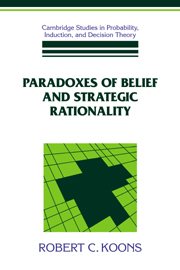Book contents
- Frontmatter
- Contents
- Preface
- Introduction
- Part I Paradoxes
- 1 Doxic paradoxes without self-reference
- 2 Doxic paradoxes and reputation effects in iterated games
- 3 A study of liar-like epistemic paradoxes
- 4 A computational account of mutual belief
- Part II Solutions
- Conclusion
- Appendix A Applying probability to mathematical sentences
- Appendix B Proofs of Theorems 2 and 3 from Chapter 6
- Appendix C On schematic generalization
- Bibliography
- Index
3 - A study of liar-like epistemic paradoxes
Published online by Cambridge University Press: 06 January 2010
- Frontmatter
- Contents
- Preface
- Introduction
- Part I Paradoxes
- 1 Doxic paradoxes without self-reference
- 2 Doxic paradoxes and reputation effects in iterated games
- 3 A study of liar-like epistemic paradoxes
- 4 A computational account of mutual belief
- Part II Solutions
- Conclusion
- Appendix A Applying probability to mathematical sentences
- Appendix B Proofs of Theorems 2 and 3 from Chapter 6
- Appendix C On schematic generalization
- Bibliography
- Index
Summary
In this chapter, I conduct a survey of the territory of epistemic and doxic paradoxes and investigate the parallels between them and the paradox of the liar. In so doing, I demonstrate that the paradox developed in the last two preceding chapters is a genuinely new result as well as make clear the strong family resemblances that bind all of these paradoxes together. In Section 3.1, I introduce what I call the “paradox of the disprover,” a close relative of Kaplan and Montague's paradox of the knower discovered by Richmond Thomason. This paradox provides an important bridge between the doxastic paradox of Chapters 1 and 2 and the more familiar paradox of the knower. In Section 3.2, I compare the theorems that constitute the doxastic and epistemic paradoxes with theorems by Gödel and Löb. Finally, in Section 3.3, I use standard modal logic to bring to light the common basis of the paradoxes (including the liar) and to classify the paradoxes into subfamilies.
THE PARADOX OF THE DISPROVER
The paradox of the disprover is not a new formal result: it is a reinterpretation of a well-known result, the Kaplan–Montague paradox of the knower, discussed in their paper “A Paradox Regained.” I will use a new version of that formal result, developed by Richmond Thomason. In place of the notion of ‘knowledge’, I will suggest in this section that we interpret this formal paradox by means of the notion of ‘subjective provability’, which I will explain in due course.
- Type
- Chapter
- Information
- Paradoxes of Belief and Strategic Rationality , pp. 43 - 61Publisher: Cambridge University PressPrint publication year: 1992

